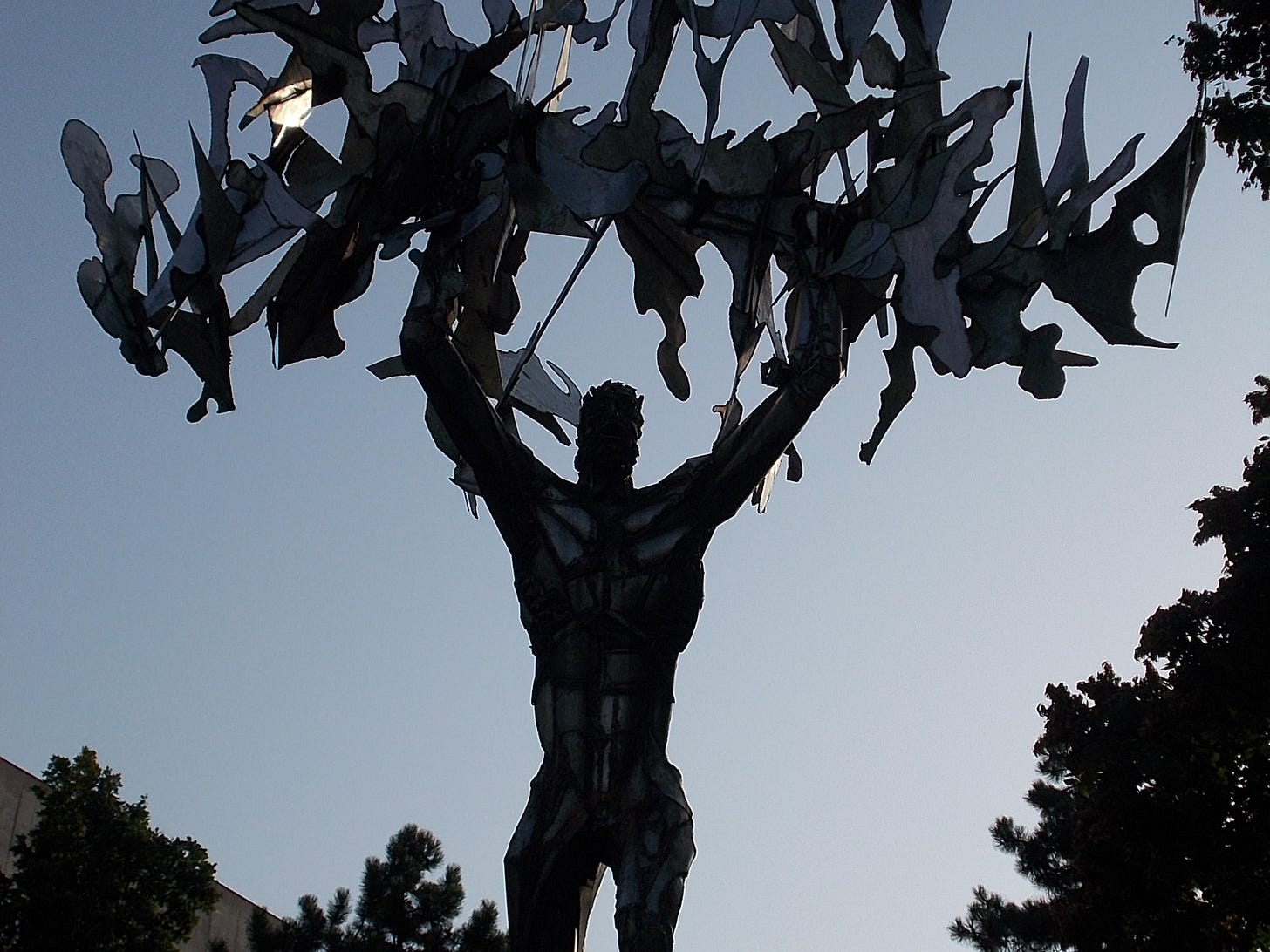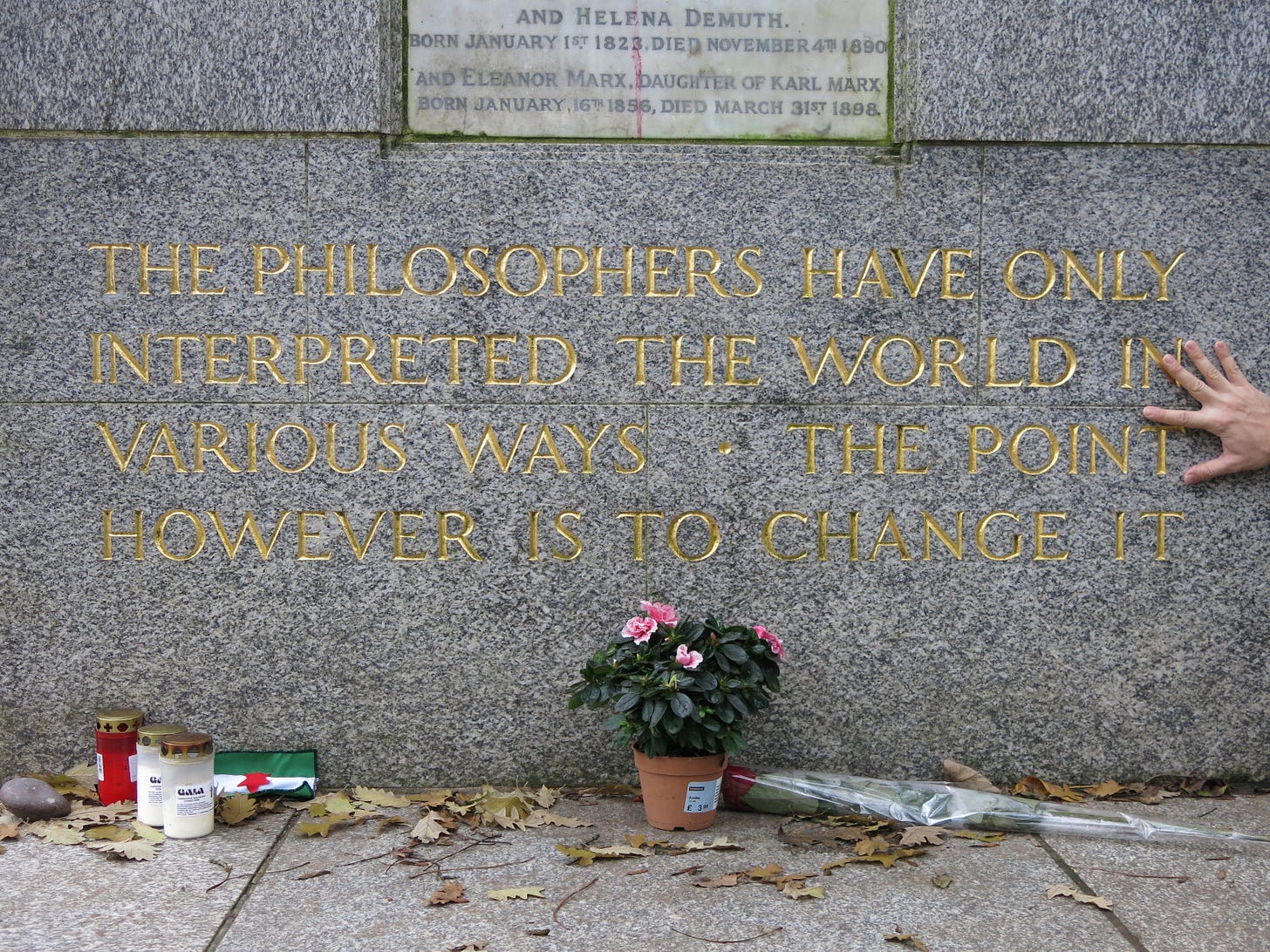Prometheism, by Jason Jorjani (updated review)
This is visionary transhumanism at its best, on steroids.
Greetings to all readers and subscribers, and special greetings to the paid subscribers!
Please scroll down for the main topic of this newsletter. But first:
I made the draft of my new book “Irrational mechanics: Narrative sketch of a futurist science & a new religion” open to a group of early readers.

With the help of my early readers, I’ll do a nice & slow revision of the draft. I plan to publish the book in September or so.
This is a new updated version of my 2020 review of “Prometheism” (2020), by Jason Jorjani.
I decided to read this book after a trusted friend recommended it as the “best and most original transhumanist-philosophy essay in a long time… A must-read for anybody interested in how to re-think and promote technology and the posthuman change.”

Jorjani’s open access essay “The Prometheist Manifesto” provides a summary of many points covered at length in the book.
After reading it cover to cover, I love and hate the book, which is four books in one: An exploration of frontier philosophy, metaphysics, and cosmology; A visionary manifesto for our cosmic evolution; An anthology of conspiracy theories (some old, some trending, some new); A cultural engineering and political action program.
I don’t care for conspiracy theories and prefer to stay away from culture wars and partisan politics, so I’ll focus on the first two. About the others I’ll just say that some of Jorjani’s conspiracy theories are fun, and some aren’t. Some of Jorjani’s social and political proposals make sense to me, and some don’t.
Jorjani’s ideas on cosmology and our cosmic evolution are similar to mine (see my books and the draft of my next book), but painted with vivid, heroic, strong colors.
I agree with Jorjani: We must advance without limits and master not only genetic engineering, nanotechnology and all that, but also weirder things like zero-point energy, time travel, and the occult sciences of “paranormal” phenomena. This can and should be the basis of future religions.
Now, I stop here and try to stay sober, but Jorjani’s vivid, intoxicating words remind of Marinetti’s futurism (1, 2), which Jorjani praises. Jorjani also enters the territory of conspiracy theories and cultural/political wars, from which I prefer to stay away. Of course, I realize that Jorjani’s formulation is stronger than mine, and much more likely to be embraced by hordes of passionate believers.
The title of Jorjani’s book, “Prometheism,” is described as a contraction of Prometheus and Theism.
Is Jorjani saying that we should worship Prometheus as a God?
Yes, in some sense. Prometheus is a powerful archetype that takes a life of its own, hijacks the minds and hearts of masses of people, and guides the evolution of humanity. Prometheus is a “spectre” in the sense used by Marx and Engels in “A spectre is haunting Europe - the spectre of Communism.”
Prometheus is not a personal God that answers our prayers, remakes our world, and grants us resurrection. But it doesn’t matter because, by embracing the Prometheus spectre, we can do all that ourselves. Prometheus is “the destining force inherent to the evolution of technological science.”
Jorjani argues that technology is “ontologically prior to science” and even “ontologically prior to the natural phenomena” studied by science. According to him, this concept can be traced back to Martin Heidegger (see “The Question Concerning Technology” in “Basic Writings”) and like-minded philosophers like Bernard Stiegler (see “La technique et le temps”).
Heidegger is often unclear and has been interpreted in different ways. Stiegler doesn’t add much in the way of clarity. But the ontological priority of technology makes a lot of sense to me. Changing the world (that is, technology) comes before understanding the world, as suggested by the words inscribed on the tomb of Karl Marx, and even before the world itself.

As I see things, the raw facts of the world come first. In his foreword to Gary Zukav’s “The Dancing Wu Li Masters,” David Finkelstein noted that the theory of quantum mechanics leaves unanswered some questions that can only be answered by experience, and quoted Niels Bohr: “Experience is too rich for our theory.”
Perceiving the world comes before understanding the world. Karl Friston’s theory of active inference, which makes a lot of sense to me, suggests that perception is one with action in an irreducible action-perception loop. That is, there’s no perceiving the world without acting upon the world to change it, and acting upon the world to change it is called technology. In Bohr’s quantum mechanics, it is the technology we use to study the fabric of quantum reality that defines the variables of our mathematical models of quantum reality.
This is how I make sense of the concept that technology is ontologically primary. However, in the spirit of neutral monism, I prefer to think that technology and natural phenomena are both ontologically primary in a logical loop. Or, what we call natural phenomena and what we call technology are aspects of primary stuff that comes before both.
Don’t let my references to Marx make you think that Jorjani is a Marxist: he isn’t.
Jorjani castigates “the reductively materialistic transhumanists” of today for deviating from the original conception of Nikolai Fedorov and the Russian Cosmists, who “certainly did not share the overly reductionist view” of many contemporary transhumanists.
“What is even more daring is the will of Fedorov and his disciples, rooted in a heretical interpretation of the Russian Orthodox belief in the Resurrection, to demand that generations of the future use the advanced technology that they have invented in order to resurrect the dead so that they can become denizens of the future cosmic paradise.”
Jorjani adopts a simulation cosmology similar (with some tweaks) to that described by Rizwan Virk in “The Simulation Hypothesis: An MIT Computer Scientist Shows Why AI, Quantum Physics and Eastern Mystics All Agree We Are In a Video Game” (2019). Like Virk, Jorjani argues that the simulation hypothesis provides the best explanations of weird quantum phenomena.
Jorjani develops a philosophical cosmology that guarantees free will. Not fake “compatibilist” free will, but real “libertarian” free will, which is “a sine qua non of any meaningful concept of existence.” I totally agree.
“we could both be inside of a designed Cosmos and also have a certain degree of free will… we are living inside of an information processing system - a gigantic quantum computer that is affected by various levels of consciousness that it generates…”
Past states of the world are archived in “Akashic records” like saved video games. Time travel is allowed in the simulation cosmology. Time travel paradoxes can be avoided by thinking of time travel into the past as “rebooting to an archived past state of play and making different choices inside of the game.” So there are many worlds, but not all the worlds of Everett’s multiverse, which would be incompatible with free will. Interestingly, Virk makes a similar point in his follow-up book “The Simulated Multiverse: An MIT Computer Scientist Explores Parallel Universes, The Simulation Hypothesis, Quantum Computing and the Mandela Effect” (2021). I discuss this at length in my forthcoming book, stay tuned.
Jorjani argues that paranormal phenomena (e.g. telepathy, clairvoyance, precognition, psychokinesis, teleportation, reincarnation) “make sense in the context of the Simulation Hypothesis… we are communicatively connected to each other, first and foremost, through the information processing system…”
It’s worth noting that Jorjani’s simulation cosmology is more sophisticated than many popular accounts. Reality could be “simulations all way down… nested within one another.” According to Jorjani, this is suggested by the theories of David Bohm and Karl Pribram, popularized by Michael Talbot in “The Holographic Universe” (1991).
I read Talbot’s book long ago and found it very impressive. Here’s a nice case of synchronicity (also discussed at length by Jorjani): while writing the first version of this review in 2020 I found out that Talbot was born on my birthday and died on my wife’s birthday.
In “Wholeness and the Implicate Order” (1980), Bohm explored the deep reality of the implicate order, which underlies our reality. I argued that, even if deep reality is whole and undivided, the simulation hypothesis is a coherent and useful mental picture.
In Jorjani’s words, our reality unfolds “from out of a background of information that is being processed in a non-local and non-linear way at a level of reality that remains hidden from us.”
“On this view, there is no objective physical reality underlying the simulation that we subjectively perceive. If programmers are manipulating our perceptions, they too are part of a holographic universe and their experiences are, in the end, as ‘virtual’ as ours, when compared to the reality of the implicate order.”
But enough metaphysics. Remember that changing the world comes before understanding the world, and even before the world itself.
Who could tolerate “being the plaything of fifth-dimensional gods?” Jorjani answers: “No one other than the Prometheist who joins their ranks himself...”
“It is possible that this means something like hacking through the coding matrix of a simulation and becoming one of its programmers… to access and recode this matrix… to embark on a cosmic conquest to recode the matrix of what has been mistaken for ‘reality.’”
And this is visionary transhumanism at its best, on steroids. This is my philosophy. I’ll forgive Jorjani for mixing it with conspiracy theories and some proposals that I dislike.


Hi Giulio,
Thanks for writing this. I recently wrote a dissertation on Jorjani and, while it takes a somewhat different perspective, it might be interesting in the context of your remarks on transhumanism. It's called "Confronting Fascism in Contemporary Esotericism: Jason Reza Jorjani's Spectral Philosophy." Here's the abstract:
"This dissertation seeks to establish the foundation for a sustainable anti-fascism through a critical examination of constructivism. Defined by the philosopher Alain Badiou as an orientation of thought which reduces truth to linguistic constructs, this dissertation argues that constructivism reinforces identitarian logics that bolster fascism. After tracing constructivism’s evolution through Immanuel Kant, Friedrich Nietzsche, and Martin Heidegger, this study turns to scrutinize the work of the contemporary philosopher, esotericist, and co-founder of the Alt-Right: Jason Reza Jorjani.
Jorjani seeks to transcend constructivism and its concomitant identitarian logic through his concept of “the spectral”— a form of negative universality aimed at delineating a generic conception of the human in excess of identitarian logics. In his attempt to formulate a universalism decoupled from closure, Jorjani embraces a form of metaphysical voluntarism. This commitment not only undergirds Jorjani’s embrace of the esoteric elements of Nazism but also fuels his fascistic, techno-accelerationist ideology that he refers to as Prometheism. By dissecting Jorjani’s failed attempt to overcome constructivism, this dissertation clarifies the deep structure of fascism and illuminates a pathway toward a genuinely inclusive and open universalism."
Best regards!